Close Reader: An interview with Christine
On weird lit, braking for crones, and owning an indie bookshop
In this series, I ask some of my favorite Substack essayists, Bookstagrammers, and writers to share their reading and writing processes and habits, and tell us about the literary ideas they’re spending time with these days.
Today’s post is too long for most email clients, so, if you run into issues reading the essay in full, click over to the web or app experience.
Today’s interview is with Christine, a dissertating literary scholar and indie bookstore owner. (Basically: she’s living my dream life!) Christine and I met on Bookstagram and have since bonded over a shared love for weird stories, especially those written by women like Shirley Jackson.
I’m beyond happy to share her answers to our interview today and give you all a chance to get to know this unbelievably wonderful human being. Here goes!
And please note, photos come from Christine’s bookstagram.
Let’s start with an introduction. What’s your name and where are you currently living?
Hi! I'm Christine, and I am variously located in Michigan and Ohio. I am a self-proclaimed rustbelt dirtbag.
What are you reading right now?
I'm currently finishing up the new translation of Clarice Lispector's The Apple in the Dark that New Directions put out in October, and next I’m planning to dig into some stories of the nautical weird by Jean Ray in a collection called Cruise of Shadows. Besides that, I’ve been rereading some stuff for the dissertation chapter I’m finishing up on Rachel Ingalls, so I’ve been enjoying getting to dive back into her work with my magnifying glass.
I have to say a few words about The Apple in the Dark. Reading Lispector is tough sledding, and I had an inclination to write a screed about the behavior of the translator who worked on this edition (and who has helmed New Directions’s larger project to reissue Lispector’s work), but I’ll just say that if you’re interested in Lispector and aren’t familiar with the controversies surrounding Benjamin Moser, do a quick Google search for him and fellow translator Magdalena Edwards. LARB published a few articles on this and they’re worth reading.
What are some of your favorite books or genres?
I think Infinite Jest was probably my first favorite book as an adult, and I’ve said it’s the first book that ever really challenged me to think differently about what fiction can do and be. It got me into literary maximalism for a period of time, and it primed me to absolutely love Lucy Ellman’s Ducks, Newburyport after spending four months wading through it this year.
I’ve also always had an affinity for dark, unsettling stuff, so I read a lot of Gothic and weird fiction and obviously worship at the altar of Shirley Jackson. I also love surrealism and the absurd, anything that flips the real on its head while offering little to no explanation. In that vein Kafka has been pretty formative for me, as has Leonora Carrington.
Ok, a few more. I’ve talked about form and genre a bit, but thematically, I’m obsessed with books about strange, old women who have become, either by choice or not, social pariahs. Barbara Comyns’s Who Was Changed and Who Was Dead, Olga Tokarczuk’s Drive Your Plow Over the Bones of the Dead, Tove Jansson’s True Deceiver, Magda Szabo’s The Door.
My car needs a bumper sticker that says “I Brake for Crones.” Can’t wait to join their ranks one day.
What ideas have you studied as a lit scholar? What is your area of specialty?
I fell in love with weird fiction in a course I took during my second year of PhD coursework. We read a lot of early weird texts, and when I read The Willows by Algernon Blackwood in those first few weeks of the semester, I was gobsmacked. As a fledgling ecocritic at the time I was really excited by all the ways weird fiction tackles questions of ecology. There were only two token women writers on the syllabus in that course, though, and despite the course’s impact on me, I was pretty irked by that. My preoccupation ever since has been reading more women writers of the weird, and within that, I’m interested in how these writers grapple with questions of motherhood and domesticity.
What ideas are you studying or exploring right now?
Well, adding on to my previous answer, I’m finishing up a dissertation that explores the weird ecology of domestic fictions in the post-45 era. I joke that this entire project is just a vehicle for spending all my time thinking about Shirley Jackson, but there are so many other writers in that period who have either been overlooked in academic discourse, or who haven’t been granted inclusion in the historically masculinized mode of the “weird.” We’ve been too busy looking for tentacles and portals to the great cosmic Outside that we haven’t given enough attention to women writers who have been finding irruptions of the weird in the claustrophobia of domestic space, in the alienation of pregnancy, and patriarchal hegemony generally. I am nothing if not petty, so while my project is certainly a love letter to these women, it’s also kind of a nose-thumbing to anyone who wants to argue that the weird can’t be found in these kinds of narratives.
“We’ve been too busy looking for tentacles and portals to the great cosmic Outside that we haven’t given enough attention to women writers who have been finding irruptions of the weird in the claustrophobia of domestic space, in the alienation of pregnancy, and patriarchal hegemony generally.”
What is your reading method? Tell us about your reading routine, habits, quirks, anything you'd like to share.
My reading routine is pretty fluid. I’m working full time while trying to finish up my dissertation, so I wake up pretty early to sneak in some writing before work. Even though I historically love starting my day reading a few pages, these days I have had to become an evening reader. On the weekends, though, my absolute favorite thing to do is sit with my partner, have our morning coffees, and read something that is not for research. The only problem is that we’re both guilty of interrupting each other every five minutes to shout and shriek about a new favorite passage that must be shared with the other immediately. It’s a problem I welcome gladly, though.
Do you prefer to read hardbacks, paperbacks, or digital copies? Why?
I prefer reading paperbacks, but I’m honestly not that picky when it comes to format. The reading list-to-salary ratio of grad school life has made me a grubby little gremlin when it comes to scoring a book I need by any means necessary. I’ve had to become pretty open to reading texts in whatever format I can get my hands on. I remember specifically scrounging online to find a free PDF version of Karen Barad’s Meeting the Universe Halfway because it cost more than I wanted to spend on any single book that was on my comprehensive exam list. I’ve since bought a copy, though, so I can put at least that specific shame to rest.
Times are slightly less drastic now than they were in those early days, so I will pretty much always avoid ill-gotten digital copies. That said, though, I do have my peculiarities, especially since becoming a bookseller. These peculiarities have less to do with format—paperback versus clothbound—and more to do with the edition itself. I’ve started to lean into my collector tendencies and have become a sucker for gorgeous vintage copies of my favorites. A recent snag I’m pretty excited about was a first edition copy of Ursula Le Guin’s The Lathe of Heaven.
What’s your annotation process like, while you read? Do you write in your books? Why or why not?
Oh, yes. I tend to annotate my books like a woman eating her last meal on this earth. I use the margins to berate characters who are frustrating me, revel in prose that moves me, etc. One of my biggest fears is that I’ll be reading and will feel a feeling so big and so intense, or I’ll draw a connection to another book that feels so serendipitous, that if I don’t physically inscribe the feeling or thought in that exact moment, it’ll be gone forever. The prospect of losing whatever inner dialogue I was having with my book makes me slightly panicky. So I scribble and scratch in the margins as much as I’m able to. For me, though, there is a point at which the pencil in my hand can get in between me and the text too much, so I try to maintain a balance between dialoguing with the text and simply experiencing the words on the page.
“I tend to annotate my books like a woman eating her last meal on this earth.”
What does closely reading mean to you? Do you consider yourself a close reader?
I do consider myself a close reader! My perspective on close reading was entirely changed by a professor I had during coursework. She was tough, but her course on critical theory completely rewired my brain. We would often spend half of our 3-hour seminar discussing A SINGLE SENTENCE from whatever text we were reading that week. It didn't matter how long or dense the text was, either. We'd follow the same approach each week. The first hour and a half we started with a sentence. And we'd just have to sit there and...say things about it. What’s going on grammatically, syntactically? What does it mean that there's a transitive verb here rather than an intransitive one? And then we’d use those discoveries to say something new about the text by looking for patterns or resonances elsewhere in its pages. This practice felt insular at first, but eventually it started to take on an air of play, of solving a puzzle or finding the right key to fit an oddly shaped lock. I don’t believe this is the only (or even the best) way to close read, but it made me see the practice in a completely new light.
Speaking of writing, what is your current writing project?
My main project right now is my dissertation. Sorry, I’m sick of talking about it too. I won’t ramble more about it here 😊
In more exciting news, I have been working on a few pieces of fiction that I would love to finish in the next year. One is a weird little fairy tale I’ve been working on in fits and starts, and I have another fairly new idea in the hopper for something a little more sinister, and I’ve been steadily jotting down some bits and pieces for that.
Describe your writing process. Where do you start? How do you get focused?
For better or worse, my writing practice is rigidly ritualized. I can’t just pick up my laptop and bang out 600 words at any time of day, in any location. I’ve stopped trying to convince myself that to be a good writer means you must be tapped into some deep magic that allows you to just sit down and ooze genius. There’s this pressure in grad school to be constantly working, constantly producing. For a while, I wasn’t letting myself set boundaries around my writing, and I had a really hard time realizing that it is actually okay for me to say “no” to that culture of overwork. When I realized that I get to decide for myself what my writing process looks like—when I write, for how long, how often—my relationship to my work became so much healthier.
“I’ve stopped trying to convince myself that to be a good writer means you must be tapped into some deep magic that allows you to just sit down and ooze genius.”
I write best first thing in the morning. I settle in at my favorite coffee shop, I get my extremely boring cup of drip coffee, I put on my headphones and listen to some flute-forward ambient jazz (Tenderlonious and Web Web are my current favorites), and I write for an hour or sometimes 90 minutes. That’s it. No matter how many words I’ve written, that’s my writing time for the day, and there’s no expectation that it’ll spill out of that structure. The routine of this is essential to me actually getting words on the page.
Describe your editing process. What’s that like? Do you self edit? Reach out to friends?
Something I’ve been working on is trying not to over-edit while I’m still drafting. I can’t help myself, though. As a result, I tend to produce pretty clean copy on a first draft, which I guess has its perks, but I do not say this to brag. Getting that first draft out of me is like pulling teeth. I hold on to my writing so tightly and I am constantly, neurotically looping back to polish and buff and spitshine until the thing comes out gleaming. You can’t polish words that aren’t on the page, though, so I’ve been trying to be less self-critical during my writing sessions so that editing can become its own practice once the draft is done.
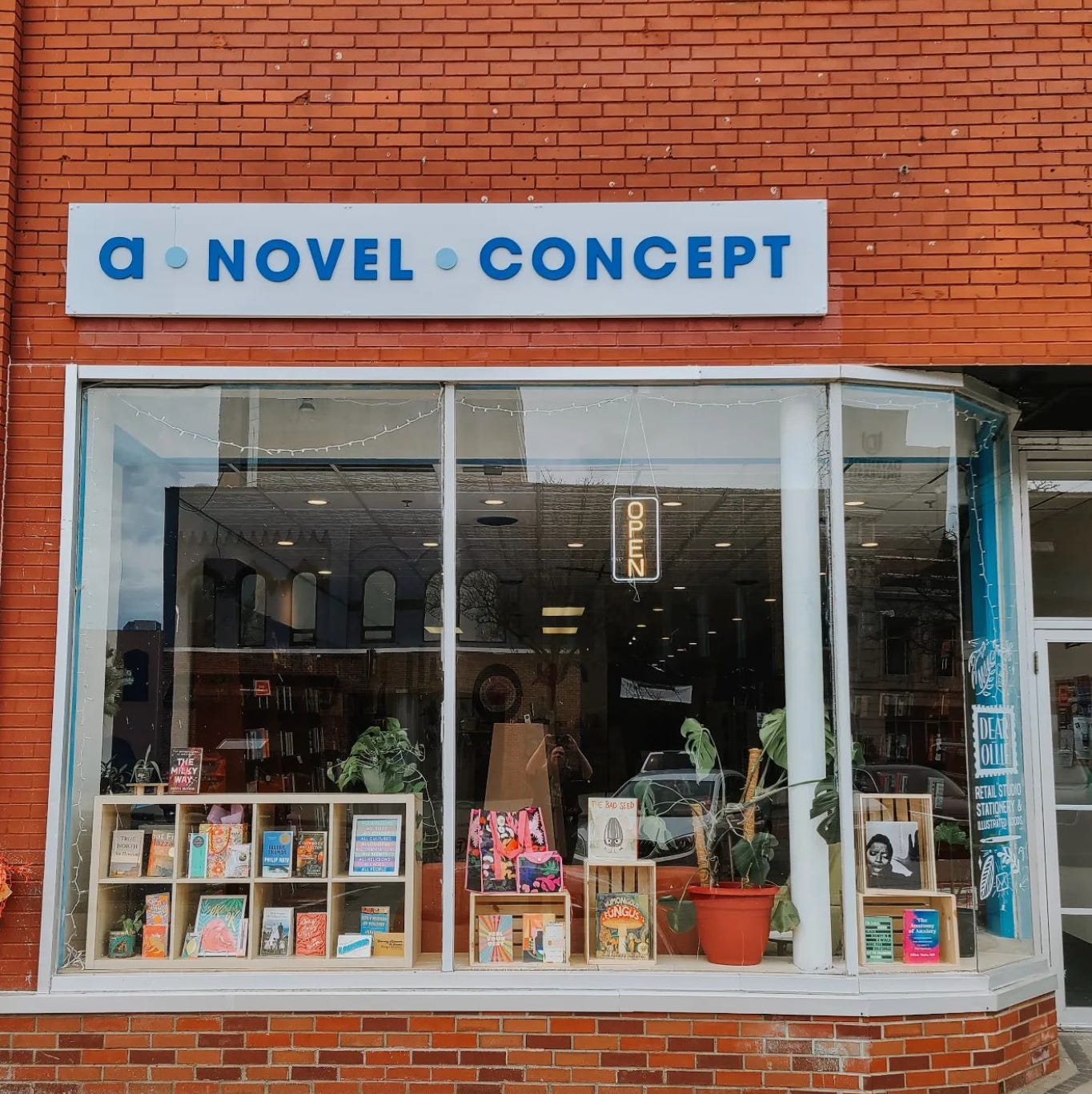
You are a bookshop owner! Can you talk about how your love for reading and researching translated into this business? What do you love about being an indie bookseller?!
Oh, I could talk about this for hours! The bookstore really came about because, truth be told, I had become pretty lost midway through my PhD program. The onset of the pandemic made me feel extremely isolated from my cohort and my department, but the disillusionment had started to creep in much earlier. I was a first generation college student and had a hard time navigating all the impostor syndrome that comes along with that. I was always questioning whether I belonged and was always finding ways to confirm my own suspicions that I didn’t. I also had a difficult relationship with my former advisor, and it made me lose sight of the reasons why I wanted to do a PhD in literature in the first place: the joy of discovery in research, the serendipity of reading across texts that I love, and connecting with people about those simple joys. I wanted all of that without all the posturing and other self-aggrandizing bullshit you find in some (not all) of academia.
“There is no greater pleasure than recommending a book to someone and having them come back to either rave or rant about it with me. This phenomenon is equally pleasurable in reverse, I’ve come to find.”
So, ok, have you ever seen Chocolat with Juliette Binoche and Judi Dench? It’s this delightfully cozy movie about a woman who moves to a very small, stodgy town in France and scandalously opens up a chocolaterie during Lent. She has a knack for guessing the “favorite” treat of every customer who comes into her shop and she has a (well-earned) chip on her shoulder about it. This, to me, is the joy of bookselling. It’s trying to connect people with books they will love. There is no greater pleasure than recommending a book to someone and having them come back to either rave or rant about it with me. This phenomenon is equally pleasurable in reverse, I’ve come to find. There are some customers I’ve gotten to know so well, and who in turn have gotten to know me and my reading habits so well, they now recommend ME books that I will love.
Get to know Christine’s lovely bookshop, A Novel Concept, right here, and shop their recommendations on Bookshop.org.
What’s your current coffee or tea order?
God, I'm so boring. I just like a good batch brew, honestly. That sort of perfectly characterizes my general needs in this current life stage: efficient, inexpensive. Pour it straight down my gullet so I can get back to work, and don’t fleece me while you do it.
Lastly, for those who want to get to know you better, where can they find your work? Share your @ for anyone who wants to follow along!
You can follow me on my bookstagram: @reading.weird, which I am admittedly absent from lately. I have plans to do a substack one day, though, and that will probably be one of the places where I share updates about that and any other future projects!
thankyouthankyouthankyou for being part of this series, Christine! I cannot wait for your Substack debut. (And I’ll be sure to share the link here, when it happens.)
For more interviews and weekly close readings each week, subscribe today.






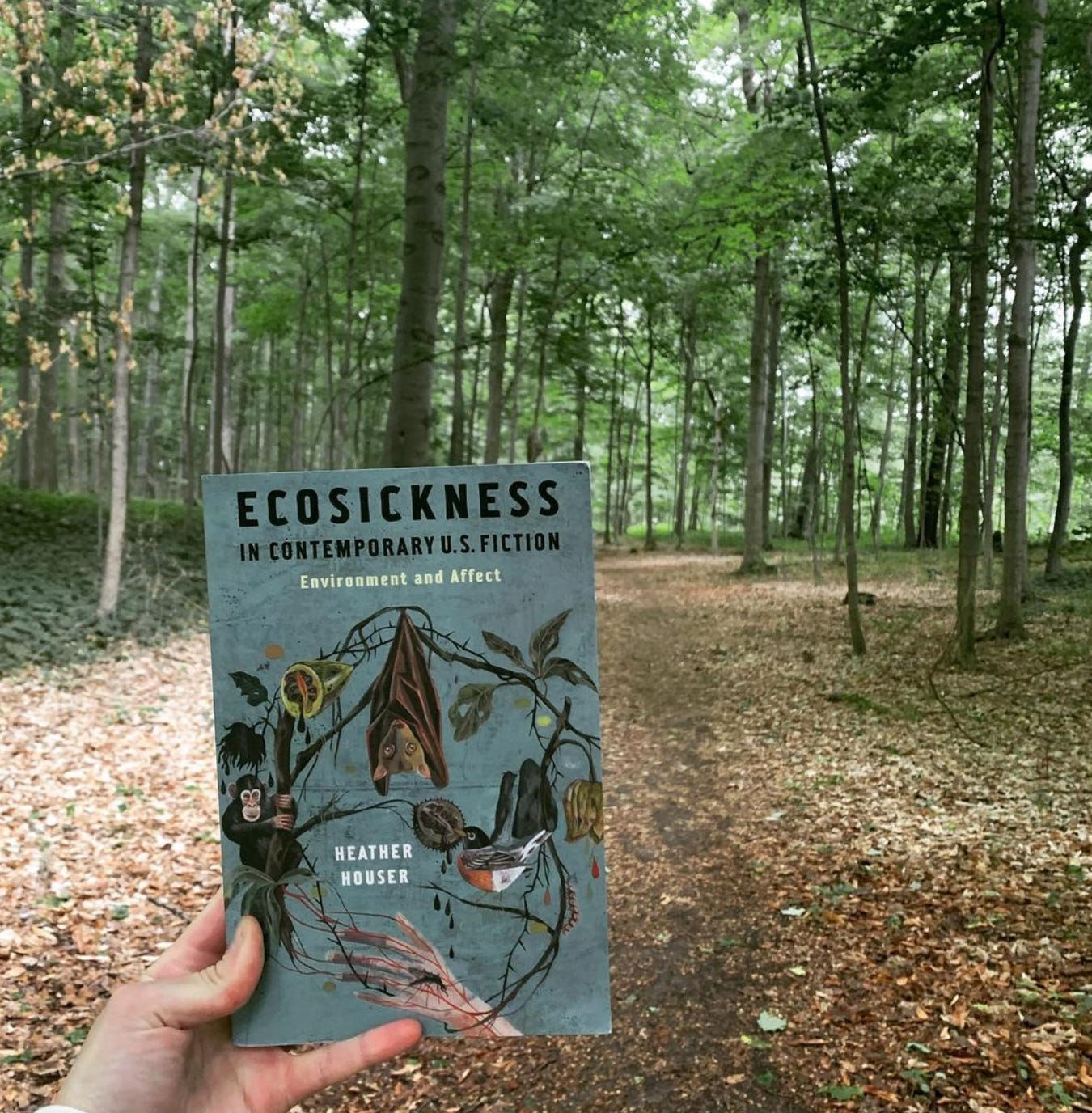
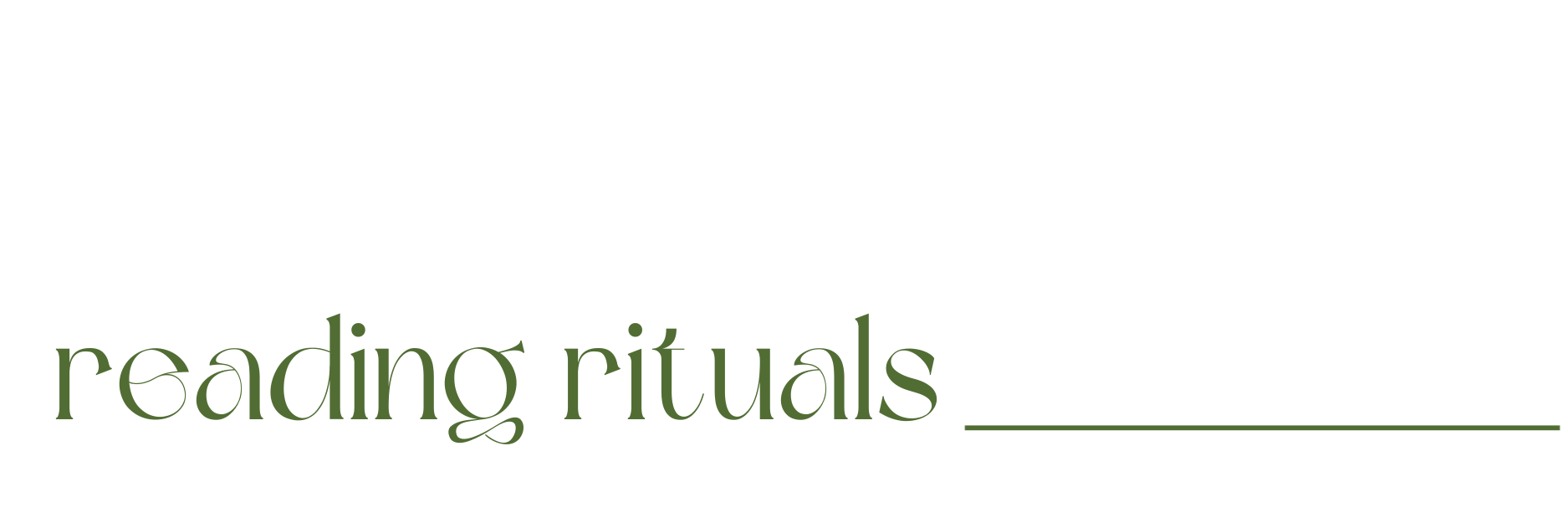


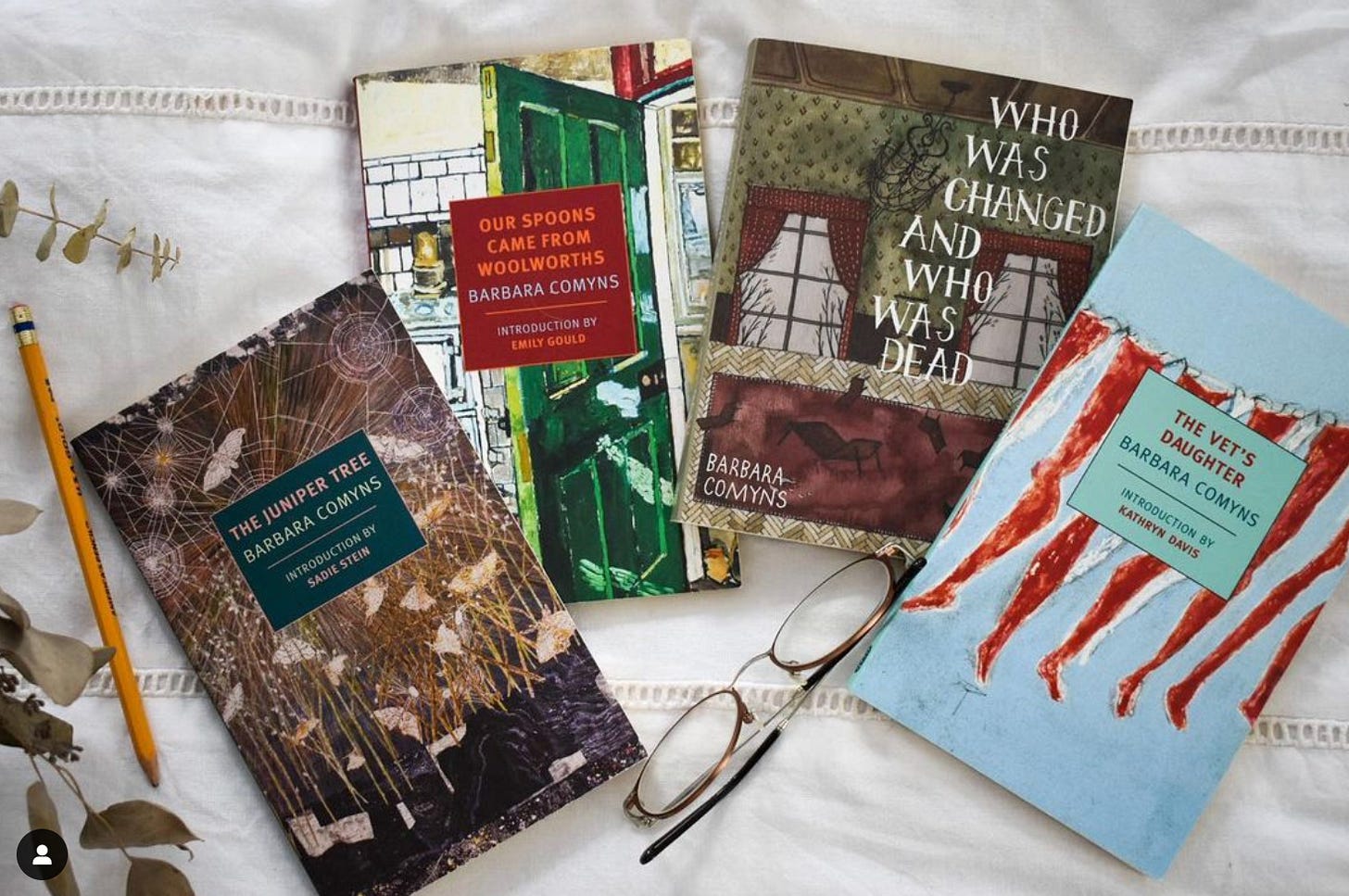

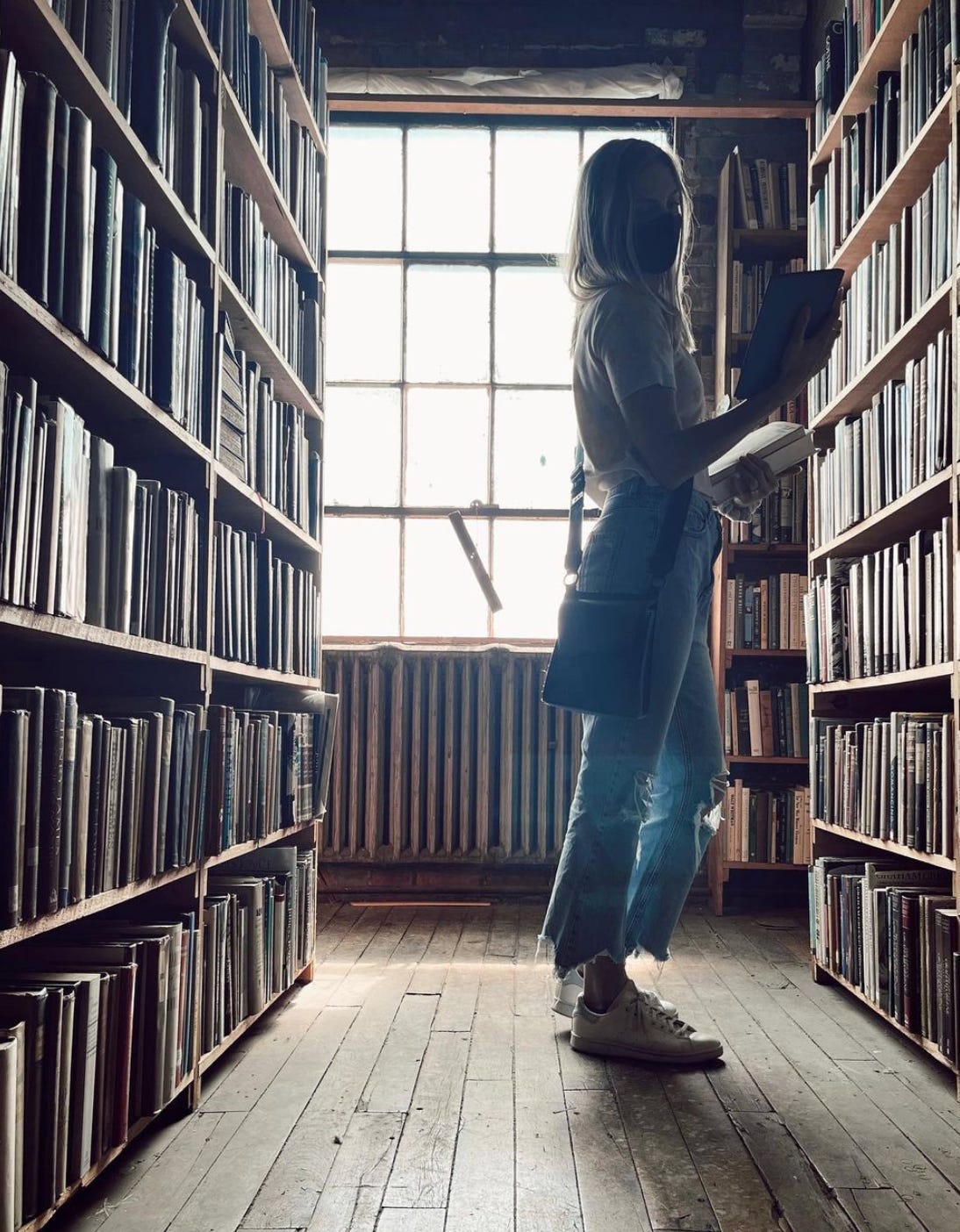
Oh man, now I need to go shop at Christine’s store because she is hella cool. (I almost spat out my drink when she brought up Clarice and the conversation surrounding her translator) Hayley I feel like you’re gonna get me to follow way too many people.
I absolutely love following Christine on insta and now I find the Chocolat reference here? A+
And I'm also loving the strange old women lit vibe!